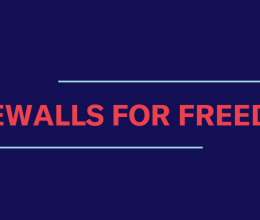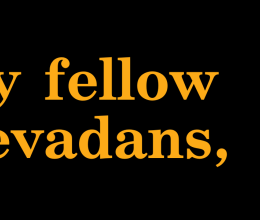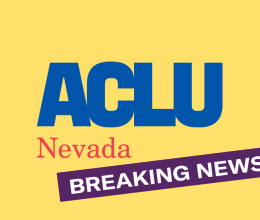
This November, Nevada voters will make decisions shaping the future of our rights, freedoms, and liberties for generations. In addition to choosing candidates at all levels of government, there will be seven ballot questions to vote on.
Below is the ACLU of Nevada’s summary and position on the seven ballot questions that will appear on Nevadans’ ballots this November. We are a nonpartisan organization and do not endorse candidates.
| Question Number | Description | Position |
|---|---|---|
| 1 |
Amends the Nevada Constitution to allow the state legislature to have more oversight and control of the Board of Regents and increase transparency and accountability in higher education. |
Support |
| 2 |
Amends the Nevada Constitution to replace outdated language with more inclusive and dignified terms: (1) “insane” to “persons with significant mental illness”; (2) “blind” to “persons who are blind or visually impaired”; and (3) “deaf and dumb” to “persons who are deaf or hard of hearing.” |
Support |
| 3 |
Amends the Nevada Constitution to allow for open primaries and ranked-choice voting. |
No Position |
| 4 |
Removes the use of slavery as a form of punishment from the Nevada Constitution. |
Support |
| 5 |
Exempts diapers from Nevada sales tax and use tax to ensure Nevadans who rely on diapers have more affordable access to this basic necessity. |
Support |
| 6 |
Enshrines the right to abortion in the Nevada Constitution. |
Support |
| 7 |
Creates additional barriers to voting by requiring individuals to show a Nevada ID when voting in person or by writing personal information on mail-in ballots. |
Oppose |
The Nevada Constitution currently requires the creation of a State University run by an elected Board of Regents, who manage the university’s affairs and funds. This ballot measure would remove the specific constitutional rules about the Board of Regents and let the Legislature decide how the university is governed and audited. Voting “yes” on Question 1 will give the Nevada Legislature more oversight and control over the Board of Regents, leading to better accountability and transparency in higher education. The Board of regents currently operates without legitimate oversight.
Nevada’s Constitution was written 160 years ago and contains outdated and offensive terms for people with disabilities, like "insane" and "deaf and dumb." This ballot question proposes to replace these with current and respectful language. It would also broaden support for individuals with intellectual or developmental disabilities by updating "institutions" to "entities." These changes reduce stigma and ensure more inclusive language, similar to federal updates made over a decade ago, making the Nevada Constitution more respectful and inclusive of all residents.
If enacted, this initiative will eliminate partisan primaries for the offices of U.S. Congressional, Governor, Lieutenant Governor, Secretary of State, State Treasurer, State Controller, Attorney General, and State Legislator. For these offices, all candidates and voters participate in a single primary election regardless of party affiliation or non-affiliation. The top five finishers advance to the general election, and the general election winner is determined by ranked-choice voting:
- General election voters will rank their candidate preferences in order from first to last if they wish to rank more than just their first preference.
- As currently provided for during certain primary races, a general election candidate receiving first-choice of more than 50% is declared the winner.
- If no candidate is the first choice of more than 50% of the voters in the general election, the candidate with the fewest votes is eliminated. Each voter who had ranked the now-eliminated candidate as their first choice has their single vote transferred to their next highest choice candidate.
- This tabulation process repeats until the one candidate with more than 50% support is determined as the winner.
If passed this November, this initiative will go into effect for the 2026 election cycle.
Slavery and involuntary servitude are unacceptable and should not exist, even in prisons. This ballot question proposes removing this outdated language from Nevada’s Constitution, aligning with other states that have done the same. The change will not affect voluntary prison work programs that allow inmates to earn work credits or wages, but would eliminate harmful language from Nevada’s Constitution.
Question 5 proposes to exempt all diapers for children and adults from Nevada’s sales and use taxes, which were established under the Sales and Use Tax Act of 1955. This would make diapers more affordable, especially benefiting low-income families and individuals with medical needs, and align Nevada with 20 other states that have already removed similar taxes. The exemption would remain in effect until December 31, 2050. By voting "Yes" on Question 5, Nevadans can reduce financial burdens on families and individuals who rely on diapers as essential healthcare items.
Abortion should remain between women and qualified healthcare providers, not politicians. Voting “Yes” would protect doctors from criminal penalties and ensure abortion access in Nevada, shielding it from extreme bans like those enacted in states such as Texas and Florida. A “Yes” vote adds a lasting safeguard so no future officials can impose restrictive laws, keeping these personal healthcare choices with families, not the government.
Under current Nevada law, ballots are counted by signature verification. Voters do not need to show their ID to vote except in certain situations, such as voters who participate in Same-Day Registration. This initiative proposes to amend the Nevada Constitution to require voters to either present a photo ID to verify their identity when voting in person or provide certain personal information to verify their identity when voting by mail ballot.
Voters who vote in person at a polling place would need to show an ID that is expired for up to four years or expired for any length of time if the voter is older than 70.
Voters who vote by mail must include certain information so that election officials can use it to verify the voter’s identity. That information includes (1) The last four digits of their Nevada driver’s license number; (2) If the voter does not possess a Nevada driver’s license, the last four digits of their Social Security Number; or (3) If the voter has neither a Nevada driver’s license or Social Security Number, the number provided by the county clerk when the voter registered to vote.
Voting is a fundamental right that should be free, fair, and accessible, but this ballot question amounts to a poll tax. Requiring an ID to vote will create more barriers to accessibility and mean fewer people will cast their ballots. Studies have shown that strict voter ID laws would disproportionately prevent many Nevada voters in underserved and minority communities from having their voices heard. This initiative does not prevent voter fraud and does not improve election integrity. We should not be creating barriers for people to vote.

